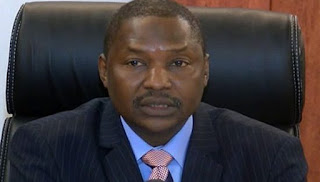FG admits limitations in investigation, prosecution as it sets to begin trial of 1,600 Boko Haram suspects September 24, 2017
By Benjamin odunayo
Days after admitting challenges in investigation and prosecution of some Boko Haram suspects in custody, the Attorney-General of the Federation (AGF) and Minister of Justice has revealed that the Federal Government was set to commence the prosecution of over 1,600 Boko Haram suspects in October.
This information was revealed in a statement issued Sunday by Salihu Othman Isah, media aide to the AGF.
Isah disclosed that Malami had approved a list of prosecutors to handle the cases while the Legal Aid Council of Nigeria had also released a list counsels who would defend the suspects.
Also, he revealed that four judges had been appointed by the Chief Judge of the Federal High Court to sit on the cases at Kainji and handle them “expeditiously”.
According to him, the prosecution “will start with the detainees in Kainji followed closely by the disposal of the cases of the detainees in Giwa Barracks, Maiduguri until the cases are exhausted.
Recall that on September 11, Isah had stated that 13 cases had been concluded, nine convictions secured, while 33 trials were ongoing at various federal high court divisions.
He had also noted that poorly investigated case files, over-reliance on confession-based evidence and lack of forensic evidence were some of the challenges faced in the prosecution of these Boko Haram suspects.
Read also: All appointments by Buhari are ‘strictly by merit’ unlike in the past- Lai
The statement reads, “All is now set to begin the arraignment of suspected Boko Haram suspects in various detention facilities in the country. It is slated to kick-start tentatively on Monday, October 7, 2017.
“The office of the national security adviser (ONSA) as the coordinator of terrorism matters is expected to assist the court by providing the relevant detainees access to deradicalisation programmes where necessary.
“This is the report of the on-the-spot assessment of the facilities and other incidentals preparatory to the commencement of trial of the over 1,600 suspected Boko Haram terrorists detained in a military detention facility located in Wawa Barracks, Kainji, New Bussa, Niger state following successes recorded by the Nigeria army and other security agencies in the fight against terrorism in Nigeria.
“A team comprising representatives of the ONSA, federal high court and the office of the honourable attorney-general of the federation were dispatched to Kainji from the 12th to 14th of September, 2017 to carry out the assessment and to discuss with relevant authorities and organisation in final preparation of the all-important national assignment.
“It will be noted that there are four categories of suspects at the Kainji detention facility mentioned above. These suspects are – Boko Haram suspects who were hitherto investigated by the joint investigation team set up by the defence headquarters and case files transmitted to the honourable attorney-general of the federation and after a careful review of the cases based on their individual merit, it was discovered that they have no prima facie cases that will sustain a charge against them in any court of law hence were recommended for release and handed over to the ONSA for rehabilitation.
“The second category is the set of suspects that the honourable attorney-general found prima facie cases against them and charges already filed at the federal high court, Abuja division who are also mostly in the detention facility under reference and may be willing to plead guilty for a lesser sentences.
“The other category are the suspects whose case file are either recommended for further investigation or that have no investigation conducted on them at all hence they do not have case files that will warrant the Honourable Attorney General of the Federation to form any opinion in respect of their case.
“Lastly, the fourth category is the suspects whose cases were reviewed and a prima facie were found and may be willing to opt for a full trial. From the above categorisation, it is important to state that the number of the suspects affected by any of the aforementioned categories would only be determined when the trial has commenced”.

Comments